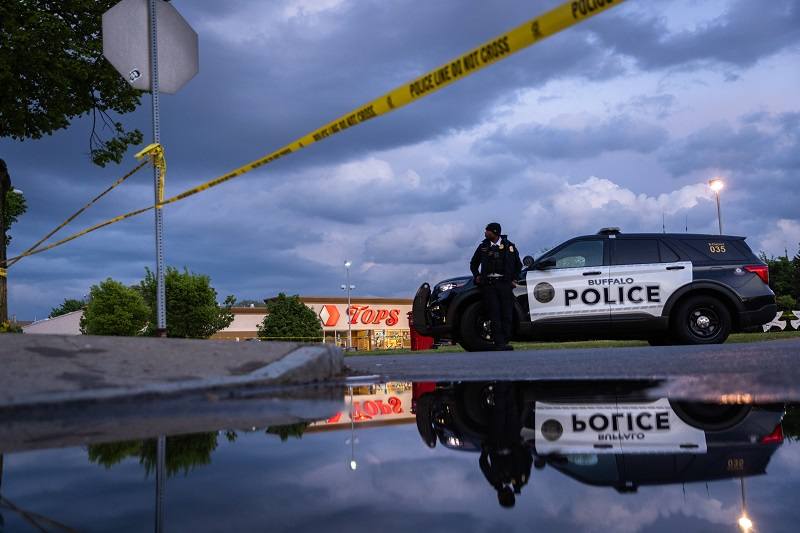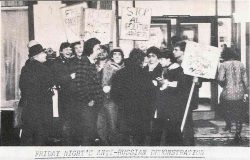
Sunlight from the setting sun illuminates the Tops Friendly Markets store on Jefferson Avenue on Monday, May 16, 2022, where 18-year-old suspect Payton Gendron is alleged to have killed ten people and wounded three others on Saturday.
16:02 JST, May 19, 2022
The day after a gunman killed 10 Black people in a Buffalo grocery store, Damon Hewitt’s phone rang. On the line was Attorney General Merrick Garland.
Garland was contacting civil rights leaders to reinforce his pledge that the Justice Department would pursue a hate-crime investigation. Hewitt, the president of the Lawyers’ Committee for Civil Rights Under Law, did not mince words: What is needed to combat domestic extremism and racist violence, he told Garland, is a Marshall Plan-style approach to galvanize federal attention and resources.
“To what degree is the federal apparatus able to and interested in protecting Black people?” Hewitt said in an interview, recounting his conversation from Sunday. “This is, once again, a test.”
Investigators from the FBI, Bureau of Alcohol, Tobacco, Firearms and Explosives, and the Justice Department’s civil rights division are combing through evidence in Buffalo and online to piece together the scope of the mass shooting and the motivation of the suspect, Payton Gendron, 18, a White man has pleaded not guilty to state charges of first-degree murder. He is scheduled to appear in court Thursday morning.
Though Justice officials will collaborate with and assist local authorities, federal prosecutors are also conducting a parallel investigation to determine whether to charge Gendron with a hate crime, a prospect that could add significant punishment, including the death penalty, legal experts said.
The federal investigation is expected to take weeks and could move at a more deliberate pace than the local probe, according to former Justice Department officials. Prosecutors must prove not only that Gendron carried out the shooting, but that he was motivated by a racist hatred of Black people — an effort that will be based on hundreds of pages of racist, white-supremacist musings he allegedly wrote and posted on the Internet.
Yet the Biden administration is facing demands to respond quickly and forcefully at a time when U.S. intelligence officials have cited domestic extremism and white nationalism as threats to national security. In remarks at the American Law Institute’s annual meeting Tuesday in Washington, Garland appeared to acknowledge the urgency, emphasizing that his department “is going to be relentlessly — and is relentlessly — investigating this as a hate crime and as a matter of racially motivated violent extremism.”
As he often does, Garland reminded his audience that the Justice Department was founded in 1870, during Reconstruction, with the primary charge to protect Black Americans from the Ku Klux Klan and other white-supremacist groups. “Preventing hate crimes is a moral obligation of every American if we expect to continue to live in a democracy,” he said. “And that is what we intend to do.”
Garland announced the federal investigation within hours of the attack on Saturday at Tops Friendly Markets, located in a predominantly Black neighborhood in Buffalo. In a statement, he called it a “senseless, horrific shooting.”
Former Justice officials said the department has traditionally let local authorities take the lead in investigating, and ultimately prosecuting, such cases, serving as a backstop to bring federal charges if local prosecutors fail to win a conviction.
But experts said pressure has mounted in recent years — particularly since the mass social justice protests in 2020 — for the federal government to take a leading role that will send a deterrence message and signal to the country that extremism and racial hate are not to be tolerated.
In February, the Justice Department won a hate-crimes conviction against three White men who already had been sentenced to life in prison for killing Ahmaud Arbery, a Black man, in Georgia in 2020. And federal prosecutors also successfully tried three former Minneapolis officers on charges of violating the rights of George Floyd, a Black man who died in police custody in 2020.
“The Department of Justice is moving much more aggressively on these cases,” said former Justice official Jonathan Smith, now the executive director of the Washington Lawyers’ Committee for Civil Rights and Urban Affairs. “It’s a different moment, and they’re responding to the real demands by communities and the urgency in these hate-driven incidents. It’s not out-of-step with the whole administration’s posture that domestic terrorism is one of the greatest threats to public safety.”
In New York, Gov. Kathy Hochul, D, said Wednesday that “domestic terrorism is the most significant threat we face as a state” and signed an executive order creating new domestic terrorism units for the state counterterrorism division and state police. She also called on lawmakers to pass legislation closing gun law loopholes.
Garland, similarly, created a new Justice Department unit this year that is focused solely on domestic terrorism, an acknowledgment that the issue is taking on greater urgency.
In their phone conversation this weekend, Hewitt said, Garland pledged a whole-of-government response and pointed to the White House’s release last summer of a National Strategy for Countering Domestic Terrorism. President Biden traveled to Buffalo on Tuesday, meeting the families of victims and calling white supremacy “a poison.”
“Their response has been important,” said Maya Wiley, president of the Leadership Conference on Civil and Human Rights, who has spoken with several senior Justice officials since the shooting. “They are making clear that they understand just how significant, outrageous and devastating this crime is. I believe this is a hate crime, and it’s not their job to bring charges before an investigation is done. But they are treating this for what it represents and the fear and trauma it is inducing across the country, not just in the community in Buffalo.”
Legal experts said federal prosecutors are most likely to pursue charges under Section 249 of Title 18, the U.S. criminal code, which allows for the federal prosecution of crimes motivated by race, religion, national origin, gender, sexual orientation or disabilities. The maximum sentence in such cases is life in prison.
Benjamin Wagner, who served as U.S. Attorney for the Eastern District of California from 2009 to 2016, said Justice also could consider a case under Section 245, which offers broad civil rights protections in federally protected activities — including interstate commerce, which prosecutors could define as shopping at a grocery store filled with goods from outside New York. A conviction under that section would allow prosecutors to seek the death penalty.
Such a scenario could present Garland with a complicated decision. Last year, under pressure from civil rights groups, he announced a moratorium on federal executions while the department undertakes a review of death-penalty policy changes made by the Trump administration. That review is ongoing. The memo does not, however, specify whether the department would seek new death sentences during that time.
The Justice Department has defended existing federal death sentences when they have been challenged in court, including for a gunman who killed nine Black parishioners at a Charleston, S.C., church in 2015 and the surviving Boston Marathon bomber. In both cases, the death sentences were pursued during the Obama administration.
“If I had to guess, I think they would go for the death penalty,” Wagner said, citing the desire by federal authorities to be consistent with prior cases.
The document that authorities said was compiled by Gendron mentions several other convicted or accused mass killers, including Dylann Roof, the avowed white supremacist who said he carried out the Charleston attack in hopes of inciting a race war.
“It would be hard for the department to explain why it would want death charges against Dylann Roof and the Tree of Life synagogue shooter and didn’t bring it in this case,” said Georgetown University law professor Paul Butler, a former federal prosecutor. He was referring to the 2018 shooting massacre of 11 people at a synagogue in Pittsburgh.
“If the evidence is what’s been suggested in the media, we’re very likely to see the department seek death in this case,” Butler said. “It’s almost more of a problem for Garland if he doesn’t seek it.”
Yet Wiley, of the Leadership Conference, said the 230 organizations that make up her coalition remain staunchly opposed to death penalty cases based on concerns that racial minorities are disproportionally targeted.
Ed Chung, a former prosecutor in Justice’s civil rights division, said Section 245 has not been used frequently since the 2009 passage of the Shepard-Byrd Hate Crimes Prevention Act. Pursuing charges under that provision could be difficult, he said.
“I wouldn’t think DOJ would add that charge on simply to have a death penalty-eligible count in the indictment,” said Chung, a vice president for Vera, which advocates for ending mass incarceration.
In Buffalo, some community members have called Gendron’s alleged actions tantamount to a lynching of Black victims, leading to speculation that federal prosecutors could seek to try him under a federal anti-lynching law that Congress approved in March. But legal experts said that law would be applicable only if Gendron had conspired with at least one other person to commit the crimes. So far, no evidence has surfaced publicly to suggest that.
To Hewitt, of the Lawyers’ Committee, the most important goal of the federal role in the Buffalo case would be to achieve “moral clarity” in the face of another attack on Black people.
Time and again, he said, such attacks have “forced America to look at itself in the mirror. We’re at that time again.”
Top Articles in News Services
-

Prudential Life Expected to Face Inspection over Fraud
-

Japan’s Nikkei Stock Average Touches 58,000 as Yen, Jgbs Rally on Election Fallout (UPDATE 1)
-

Hong Kong Ex-Publisher Jimmy Lai’s Sentence Raises International Outcry as China Defends It
-

Trump Names Former Federal Reserve Governor Warsh as the Next Fed Chair, Replacing Powell
-

Suzuki Overtakes Nissan as Japan’s Third‑Largest Automaker in 2025
JN ACCESS RANKING
-

Japan Institute to Use Domestic Commercial Optical Lattice Clock to Set Japan Standard Time
-

Israeli Ambassador to Japan Speaks about Japan’s Role in the Reconstruction of Gaza
-

Man Infected with Measles May Have Come in Contact with Many People in Tokyo, Went to Store, Restaurant Around When Symptoms Emerged
-

China Eyes Rare Earth Foothold in Malaysia to Maintain Dominance, Counter Japan, U.S.
-

Prudential Life Insurance Plans to Fully Compensate for Damages Caused by Fraudulent Actions Without Waiting for Third-Party Committee Review

























